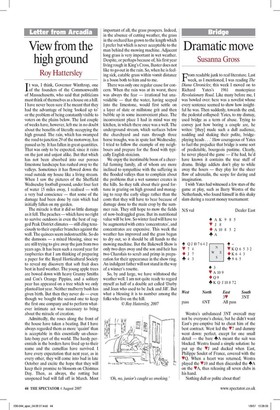View from the high ground
Roy Hattersley It was, I think, Governor Winthrop, one of the founders of the Commonwealth of Massachusetts, who said that politicians must think of themselves as a house on a hill. I have never been sure if he meant that they had the advantage of being 'looked up to' or the problem of being constantly visible to voters on the plains below. The last couple of weeks have, however, left me in no doubt about the benefits of literally occupying the high ground. The rain, which has swamped the road to junction 29 of the motorway, has passed us by. It has fallen in great quantities. That was only to be expected, since it rains on the just and unjust alike. But that which has not been absorbed into our porous limestone landscape has rushed away to the valleys. Sometimes it has flowed down the road outside my house like a living stream. When I saw the pictures of the Sheffield Wednesday football ground, under four feet of water 15 miles away, I realised — with a very bad conscience — that some of the damage had been done by rain which had initially fallen on my garden.
The miracle is that it did so little damage as it fell. The peaches —which have no right to survive outdoors in even the best of rugged Peak District climates — still cling tenaciously to their espalier branches against the wall. The quinces seem indestructible. So do the damsons — a mixed blessing, since we are still trying to give away the jam from two years ago. It has been such a record year for raspberries that I am thinking of preparing a paper for the Royal Horticultural Society to reveal my discovery that soft fruit does best in hard weather. The young apple trees are bowed down with heavy Granny Smiths and Cox's Orange Pippins, and a solitary pear has appeared on a tree which we only planted last year. Neither mulberry bush has given birth. But then they never do — even though we bought the second one to keep the first one company and to perform whatever intimate act was necessary to bring about the miracle of creation.
Admittedly, the roses along the front of the house have taken a beating. But I have always regarded them as more 'quaint' than is acceptable in this essentially un-chocolate-boxy part of the world. The hardy perennials in the borders have lived up to their name and the camellias have survived. I have every expectation that next year, as in every other, they will come into bud in late October and excite the hope that they will keep their promise to blossom on Chistmas Day. Then, as always, the rotting but unopened bud will fall off in March. Most important of all, the grass prospers. Indeed, in the absence of cutting weather, the grass in the orchard has grown to the length which I prefer but which is never acceptable to the man behind the mowing machine. Adjacent long grass is very important in wet weather. Despite, or perhaps because of, his first year living rough in King's Cross, Buster does not like to go out in the rain. So, when he is feeling sick, eatable grass within vomit distance is a boon both to him and to me.
There was only one regular cause for concern. When the rain was at its worst, there was always the fear — irrational but unavoidable — that the water, having seeped into the limestone, would first settle on a layer of slate or millstone grit and then bubble up in some inconvenient place. The inconvenient place I had in mind was my kitchen, in which there once was a well. The underground stream, which surfaces below the churchyard and runs through three horse troughs, was in spate last Wednesday. I tried to follow the example of my neighbours and prepare for the flood with typically English stoicism.
We enjoy the inestimable boon of a cheerful farming family, all of whom are more inclined to sympathise with the suffering in the flooded valleys than to complain about the problems that a wet summer creates in the hills. So they talk about their good fortune in grazing on high ground and managing to reap the early silage rather than the costs that they will have to bear because of damage done to the main crop by the summer rain. They still hope to mow the fields of now-bedraggled grass. But its nutritional value will be low. So winter feed will have to be augmented with extra 'concentrates', and concentrates are expensive. This week the weather has improved and the grass begun to dry out, so it should be all hands to the mowing machine. But the Bakewell Show is only two days away and the son and heir has two Charolais to scrub and primp in preparation for their appearance in the show ring. An indulgent father will not stand in the way of a winner's rosette.
So, by and large, we have withstood the weather well. I am not quite ready to regard myself as half of a double act called 'Darby and Joan who used to be Jack and Jill'. But what a blessing it is to number among the folks who live on the hill.
Roy Hattersley, 2007








































 Previous page
Previous page